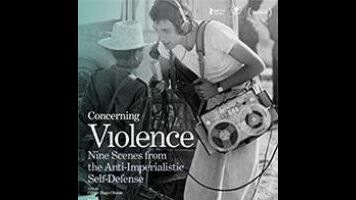Concerning Violence brings a revolutionary’s words to harrowing life

Subtitled “Nine Scenes From The Anti-Imperialistic Self-Defense,” this edifying essay film by director Göran Hugo Olsson (2011’s The Black Power Mixtape 1967-1975) certainly puts its heady intentions front and center. A dry and lengthy introduction from Columbia University professor Gayatri Chakravorty Spivak (photographed from two lulling, alternating angles) lays out the history of what’s to follow: In 1961, Afro-French revolutionary and author Frantz Fanon wrote a controversial decolonization tome entitled The Wretched Of The Earth. It explored the dehumanizing physical and psychological effects of colonialism and advocated justified violence by oppressed peoples on their oppressors. It did not fare well with the Gallic government (then involved in the Algerian War) and was censored.
Olsson’s film—divided into a preface, nine chapters, and a conclusion—is, in part, an adaptation of the book. Passages written by Fanon are superimposed on-screen (rhythmically, word by word) and read with spellbinding fervor by “miseducated” singer-songwriter Lauryn Hill. Archival documentary footage (from the 1960s, ’70s, and ’80s) of African countries like Liberia, Mozambique, and Burkina Faso runs beneath the text, almost all of it chronicling some kind of violent uprising or the devastating aftereffects. After Professor Spivak’s tranquilizing introduction, the first images—of heavily armed men in helicopters shooting down a field full of cattle—are a deeply unpleasant shock. One animal takes a particularly long time to die, and, with each bullet that doesn’t kill it, convulses in what can only be described, anthropomorphically, as pure fear. The more horrifying implication is that there’s no true word for what the beast is going through, and it’s impossible, by the end of the scene, to not imagine a human being in the same terrible situation.
This opening acts as a jolt to the system, and actually helps the viewer attune to Fanon’s stimulating ideas and acclimate to Olsson’s unflinching filmmaking. Every subsequent scene carries some kind of charge, though none are as graphically violent. Footage of rich, white Britons lounging around the former colony of Rhodesia (now Zimbabwe) and being waited on by black Africans, whom they’ll occasionally insult, gets the blood boiling. A 1960s-era interview with a Swedish missionary and his wife is nauseating for the ignorance on display. (Rage rises when this purported man of God says that building a church is more important than erecting a school or a hospital.) Perhaps most horrifying is the visit to a Mozambique clinic, where a young mother and her infant sit, silently and despairingly, as the cauterized stumps where their limbs used to be are cleaned and bandaged.
In other words, Concerning Violence isn’t out to soothe its audience with platitudes about peace, love, and understanding. Its exploration of an entrenched system that breeds generations of oppression and violence is extremely upsetting yet still highly rewarding. (And though the film mainly concerns itself with Europe, don’t think the United States is let off the hook.) The clinical presentation of this abrasive footage, married with Hill’s impassioned recitations of Fanon’s words, stirs up the kind of revolutionary sensations that, one hopes, might be channeled toward some kind of genuinely effective and long-lasting change.